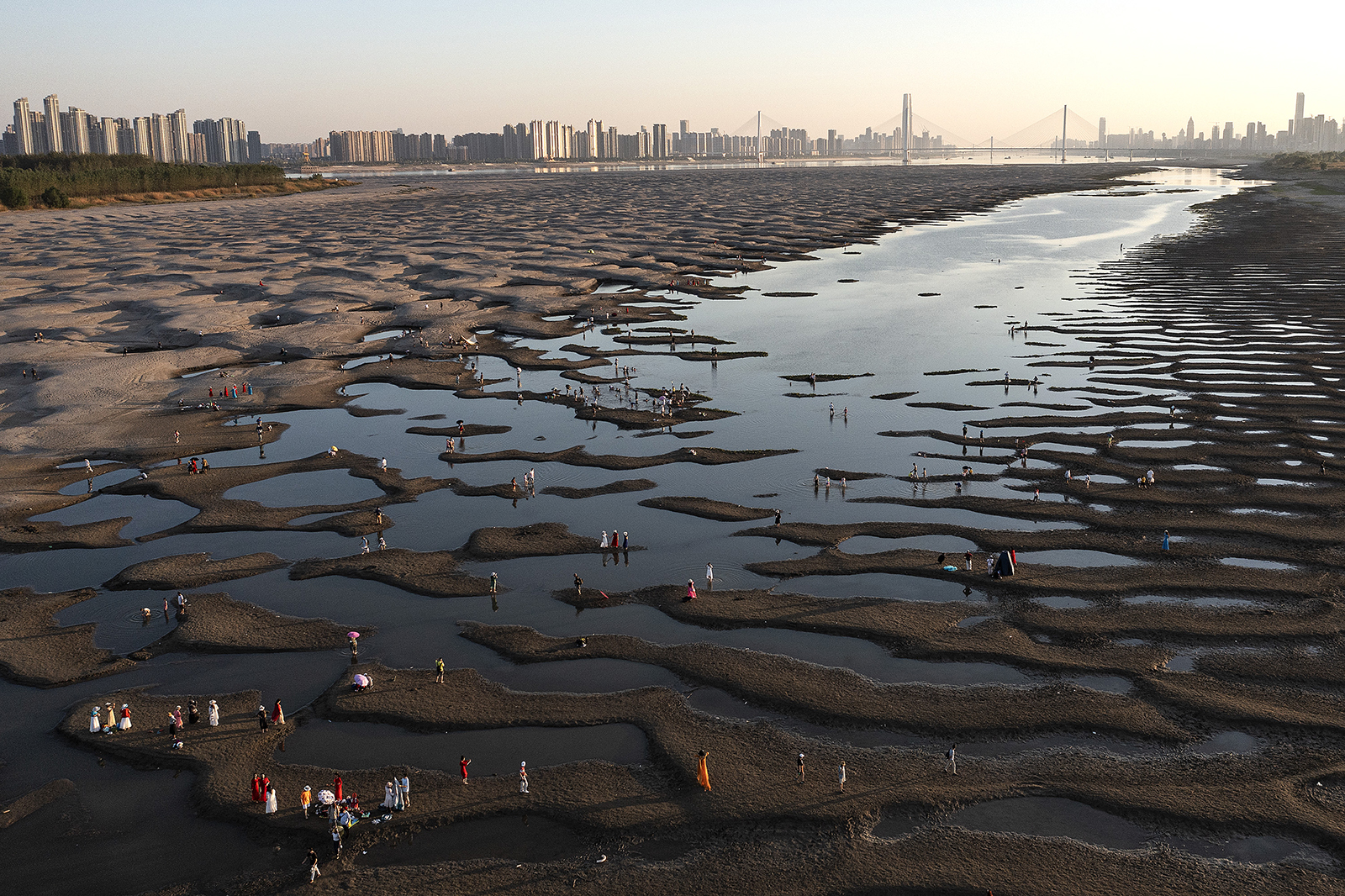
A view of the Yangtze River tidal flat during sunset recently in Wuhan, China.
Photo: Getty Images
The big issues of our time transcend borders, nationalities and oceans. This past year, power has become more diffuse, many leading Western countries are paralyzed by crisis and polarization, and new players are asserting themselves, taking a slice of the power pie.
On their latest podcast, the Altamar team of Peter Schechter and Muni Jensen asked Tom Friedman, the pulitzer-winning New York Times columnist, what worries him and what gives him hope for the new year.
According to Friedman, “The two shaping megatrends in our world today are a technology supercycle and a climate supercycle. In technology, we’ve developed the ability to basically embed sensors, connectivity, processing power and acting power into everything. … The other, of course, is in climate. That we emit CO2, we melt ice, we change ocean currents, we change wind currents, we produce extreme weather. The climate gets weird. We’re in the middle of a giant phase of global weirding. … Those two are the big megatrends out of which everything else really flows.”
And what is he optimistic about? Friedman said, “[In] our recent midterm elections, we saw an expression of civic health that no one predicted, that no one anticipated but that was remarkable. Principled Republicans, principled Independents, principled Democrats went into the voting booth, identified who was an election denier, whether at the state or local or federal level, and in virtually every case, not all but virtually every case, identified those people and made sure they weren’t elected. And that is a sign of civic health that buoys me.”
The End of a 40 Year Cycle in China
Friedman recently wrote a column about China’s increasing decoupling from the West and from the international system. “The years 1979 – 2019 was an epoch of unconscious integration … by some estimates, 800 million people came out of poverty faster … than any time in the history of the world. And there was no great power conflict. As four decades go, it’s a pretty good four decades. We will miss it when it’s gone. And it’s going.”
“It’s going primarily for two reasons: One is because of China’s own development. It’s become a pure economic and military power. … When we were trading with China for 30 of the 40 years, China sold us shallow goods — goods we wore on our shoulders, goods we wore on our feet, goods we wore on our ankles, solar panels we put on our roof — while we sold them deep goods — software and computers that went deep into their systems and their government, everywhere.
First time in humanity, we have a realm where we’re all connected, but no one’s in charge.
[Now,] when [China] wants to sell us deep goods, the fact that we don’t share common values really matters. … The other [reason] is that [President] Xi Jinping came to power in China. China today is so much more open than it was 40 years ago, but thanks to [President] Xi, it’s now more closed than it was 10 years ago. So, he took China on a complete reverse in terms of openness for the world into China, and for China out to the world. And those things together have really ended this 40-year decade of one economy, two countries.”
Always Bet on Open Systems
From Russia’s invasion of Ukraine to new and shifting alliances to the backsliding of democracy, political trends seem transnational rather than country-specific. Altamar’s Muni Jensen asked, “Can you draw the power landscape that you see today?” Friedman said, “Those two super cycles I just described in technology and climate have made us interdependent. That’s the uber-uber trend, you know, sitting on this planet.
“And so, the big challenge politically is — can we collaborate now as a global species in order to manage this technology trend and to manage the climate? … In a rapidly changing world, I’ll bet on [the advantages of] open systems seven days a week. In a rapidly changing world, open systems always get the signals first. When you’re an open system, you get all the signals of change first, and secondly, open systems like ours, if we keep it open, hopefully, attract the most high-IQ risk-takers. And high-IQ risk-takers are the engine of wealth.”
The Limits to Freedom
“The danger here is that because of the nature of technology, it is a lot easier to get your ‘freedom from’ whatever that tyrannical thing is. … ‘Freedom to’ is another question. And ‘freedom to’ is what it’s all about. Because ‘freedom to’ requires institutions. That is, we are free to start a restaurant in Washington because we have rules and regulations that enable us to do that.
“We are free to start a company because we have markets that are properly governed. We are free to have an abortion in Maryland because our state legislature has enshrined that in law. And the danger of all these new technologies and protest movements is that they’re really good at getting freedom from the old system, but they’re really bad at producing ‘freedom to,’ that is coming together on a new structure that will enable everyone to have their rights. That’s the real tension up there.”
What Is the Level of Economic Distress?
What is the level of economic distress the world is facing and where? Friedman said, “We’ve just finished a 15-year period, almost, 14 years of basically interest-free money starting in America, then in the whole Western world, then spilling out to the developing world. And that era is over. God, it was fun when it lasted. But it’s over. And we’re going to normalize here. And that doesn’t mean interest rates are going to be 10%, I don’t think. But they could be five or six or four for a while. And that will affect every entrepreneur, every business, every saver.”
What will the energy revolution look like? Friedman said, “Green energy, efficiency-energy in general is a scale challenge. If you don’t have scale, you have a hobby. And I like hobbies. I used to build model airplanes, but I wouldn’t try to change the climate as a hobby. And so, you have got to be very tough-minded about this. … I wish everyone could live on wind and solar, but they can’t. And so we need to be very realistic about this. … How do we make the transition from fossil fuels to renewables as fast as we can, at the scale we can, in the greenest way we can. That’s our challenge.”
We closed the podcast by returning to Friedman’s second megatrend — technology. Friedman elaborated, “First time in humanity, we have a realm where we’re all connected, but no one’s in charge. And China said we are going to actually project our Chinese values into Chinese cyberspace, our communist values. What do we in the West do? We say, ‘please Mark [Zuckerberg], please Mark, please be nice to us. Please turn down the volume on hate and division spewing out of your platforms. If we say pretty please, would you do that?’
And I’m not against any of these guys, but we all need rules. And when you control a platform with this much speed, scope and scale, you need rules even more. So I’m all for ‘freedom from,’ but I’m really big on ‘freedom to.’ Whether you’re talking about the streets of Tehran or the platform of Twitter.”









